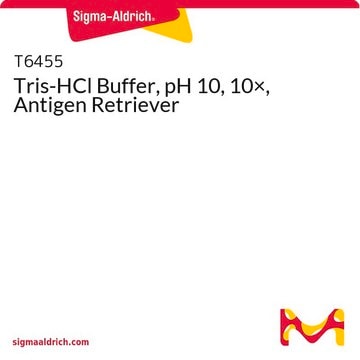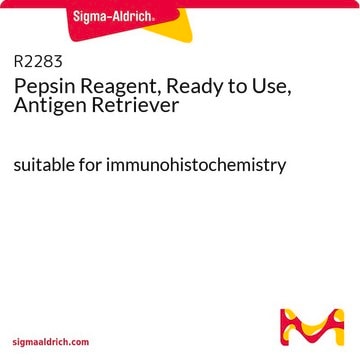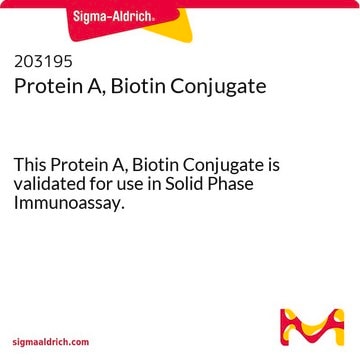E1161
EDTA Buffer, pH 8.5, 10×, Antigen Retriever
Zaloguj sięWyświetlanie cen organizacyjnych i kontraktowych
About This Item
Kod UNSPSC:
12352107
NACRES:
NA.47
Polecane produkty
Powiązane kategorie
Zastosowanie
Used as a heat-induced antigen retriever on formalin-fixed paraffin-embedded (FFPE) tissue sections prior to application of antibodies. In immunohistochemistry (IHC), most commonly used fixatives such as formalin mask tissue antigens (cellular, membrane, and nuclear) by their intrinsic crosslinking. This masking results in poor or no staining in IHC. The use of EDTA buffer, pH 8.5, or other antigen retrieval solutions on FFPE tissue sections improves accessibility of antibodies to tissue antigens. EDTA buffer has been used to heat tissue sections in order to visualize antigens by immunohistochemical analysis.
Hasło ostrzegawcze
Warning
Zwroty wskazujące rodzaj zagrożenia
Zwroty wskazujące środki ostrożności
Klasyfikacja zagrożeń
Aquatic Chronic 3 - Skin Sens. 1
Kod klasy składowania
12 - Non Combustible Liquids
Klasa zagrożenia wodnego (WGK)
WGK 3
Temperatura zapłonu (°F)
Not applicable
Temperatura zapłonu (°C)
Not applicable
Certyfikaty analizy (CoA)
Poszukaj Certyfikaty analizy (CoA), wpisując numer partii/serii produktów. Numery serii i partii można znaleźć na etykiecie produktu po słowach „seria” lub „partia”.
Masz już ten produkt?
Dokumenty związane z niedawno zakupionymi produktami zostały zamieszczone w Bibliotece dokumentów.
Klienci oglądali również te produkty
Expressions of matrix metalloproteinases 2, 7, and 9 in carcinogenesis of pancreatic ductal adenocarcinoma.
Jakubowska K, et al.
Disease Markers, 2016 (2016)
Thomas J Gniadek et al.
Modern pathology : an official journal of the United States and Canadian Academy of Pathology, Inc, 30(4), 530-538 (2017-01-07)
Predicting response to checkpoint blockade therapy for lung cancer has largely focused on measuring programmed death-ligand 1 (PD-L1) expression on tumor cells. PD-L1 expression is geographically heterogeneous within many tumors, however, and we questioned whether small tissue samples, such as
Hong-Wei Sun et al.
Cancer immunology research, 9(1), 20-33 (2020-11-13)
Metabolism is reprogrammed in cancer to fulfill the demands of malignant cells for cancer initiation and progression. Apart from its effects within cancer cells, little is known about whether and how reprogramed metabolism regulates the surrounding tumor microenvironment (TME). Myeloid-derived
Nasz zespół naukowców ma doświadczenie we wszystkich obszarach badań, w tym w naukach przyrodniczych, materiałoznawstwie, syntezie chemicznej, chromatografii, analityce i wielu innych dziedzinach.
Skontaktuj się z zespołem ds. pomocy technicznej












